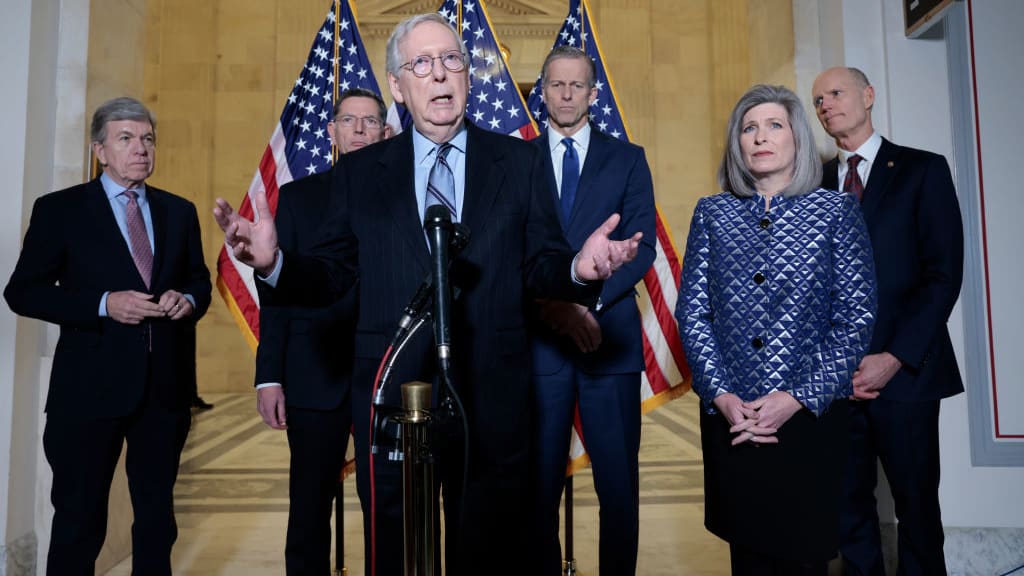Attempt to change Senate filibuster rule fails after Republicans block voting rights bill


A free daily email with the biggest news stories of the day – and the best features from TheWeek.com
You are now subscribed
Your newsletter sign-up was successful
The Senate on Wednesday night voted against changing the chamber's filibuster rule, which Democrats say is necessary in order to push through voting rights legislation that is being blocked by Republicans.
The vote was 52-48, with two Democratic senators — Joe Manchin of West Virginia and Kyrsten Sinema of Arizona — joining the Republicans in opposition.
Democrats had hoped to change the filibuster rule so they would only need a simple majority to pass voting rights legislation, rather than the 60 votes necessary to beat a filibuster. Earlier in the night, Senate Republicans blocked a voting rights bill for the fifth time in six months.
The Week
Escape your echo chamber. Get the facts behind the news, plus analysis from multiple perspectives.

Sign up for The Week's Free Newsletters
From our morning news briefing to a weekly Good News Newsletter, get the best of The Week delivered directly to your inbox.
From our morning news briefing to a weekly Good News Newsletter, get the best of The Week delivered directly to your inbox.
The voting rights legislation aims to restore parts of the 1965 Voting Rights Act that have been chipped away by the Supreme Court, making it easier for people to vote in person and by mail. This is in direct response to Republican-led state legislatures passing restrictive voting laws that Democrats say make it harder for most people, especially minorities, to vote.
The floor debate on the matter lasted about 10 hours. Sen. Raphael Warnock (D-Ga.), whose state imposed strict voting laws in the wake of the 2020 presidential election, declared that this is "a moral moment," while Sen. John Thune (R-S.D.) took umbrage to links being made between the GOP and Jim Crow laws. "I am not a racist," he said. "Nor are the people who I know in the state of South Dakota."
A free daily email with the biggest news stories of the day – and the best features from TheWeek.com
Catherine Garcia has worked as a senior writer at The Week since 2014. Her writing and reporting have appeared in Entertainment Weekly, The New York Times, Wirecutter, NBC News and "The Book of Jezebel," among others. She's a graduate of the University of Redlands and the Columbia University Graduate School of Journalism.
-
 Why is the Trump administration talking about ‘Western civilization’?
Why is the Trump administration talking about ‘Western civilization’?Talking Points Rubio says Europe, US bonded by religion and ancestry
-
 Quentin Deranque: a student’s death energizes the French far right
Quentin Deranque: a student’s death energizes the French far rightIN THE SPOTLIGHT Reactions to the violent killing of an ultraconservative activist offer a glimpse at the culture wars roiling France ahead of next year’s elections
-
 Secured vs. unsecured loans: how do they differ and which is better?
Secured vs. unsecured loans: how do they differ and which is better?the explainer They are distinguished by the level of risk and the inclusion of collateral
-
 ‘States that set ambitious climate targets are already feeling the tension’
‘States that set ambitious climate targets are already feeling the tension’Instant Opinion Opinion, comment and editorials of the day
-
 Labor secretary’s husband barred amid assault probe
Labor secretary’s husband barred amid assault probeSpeed Read Shawn DeRemer, the husband of Labor Secretary Lori Chavez-DeRemer, has been accused of sexual assault
-
 Trump touts pledges at 1st Board of Peace meeting
Trump touts pledges at 1st Board of Peace meetingSpeed Read At the inaugural meeting, the president announced nine countries have agreed to pledge a combined $7 billion for a Gaza relief package
-
 NIH director Bhattacharya tapped as acting CDC head
NIH director Bhattacharya tapped as acting CDC headSpeed Read Jay Bhattacharya, a critic of the CDC’s Covid-19 response, will now lead the Centers for Disease Control and Prevention
-
 Witkoff and Kushner tackle Ukraine, Iran in Geneva
Witkoff and Kushner tackle Ukraine, Iran in GenevaSpeed Read Steve Witkoff and Jared Kushner held negotiations aimed at securing a nuclear deal with Iran and an end to Russia’s war in Ukraine
-
 Pentagon spokesperson forced out as DHS’s resigns
Pentagon spokesperson forced out as DHS’s resignsSpeed Read Senior military adviser Col. David Butler was fired by Pete Hegseth and Homeland Security spokesperson Tricia McLaughlin is resigning
-
 Judge orders Washington slavery exhibit restored
Judge orders Washington slavery exhibit restoredSpeed Read The Trump administration took down displays about slavery at the President’s House Site in Philadelphia
-
 Hyatt chair joins growing list of Epstein files losers
Hyatt chair joins growing list of Epstein files losersSpeed Read Thomas Pritzker stepped down as executive chair of the Hyatt Hotels Corporation over his ties with Jeffrey Epstein and Ghislaine Maxwell
